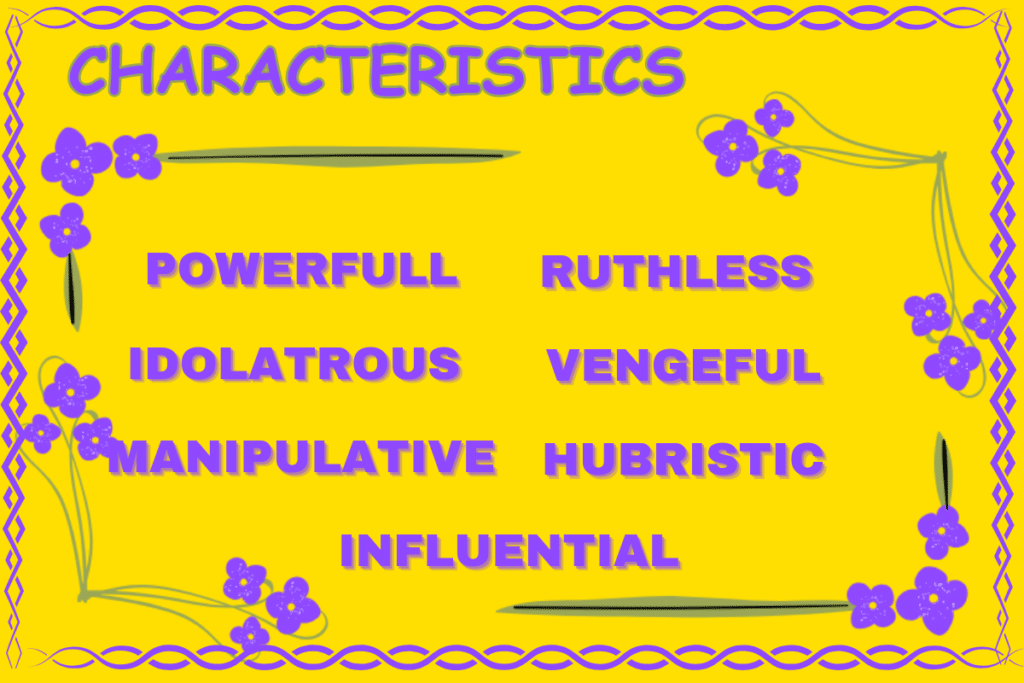JUDICIOUS JEZEBEL IN THE BIBLE
The name “Jezebel” in the Bible is associated with negative traits like wickedness and deceit due to the actions of the Phoenician queen, wife of King Ahab, as described in the Old Testament. Derived from the Hebrew name “אִיזֶבֶל” (Izebel), its exact meaning is debated but is often interpreted to mean “not exalted” or “unhusbanded.” Jezebel is known for promoting the worship of Baal and opposing the prophets of Israel, leading to her negative portrayal in biblical narratives, which has shaped the name’s connotation over time.

The story of Jezebel in the Bible serves as a cautionary tale about the dangers of idolatry, manipulation, and abuse of power. As the wife of King Ahab, she promoted the worship of Baal, persecuted prophets of Yahweh, and orchestrated the murder of an innocent man to seize his property. Her actions led to a spiritual decline in Israel and provoked God’s wrath.
Jezebel’s grisly death, as foretold by the prophet Elijah, illustrates the consequences of disobedience and wickedness. The biblical authors use Jezebel’s story to highlight the importance of faithfulness to God, justice, and moral integrity in leadership. Her infamy has endured as a symbol of female treachery and evil.
Background of Jezebel in the Bible
Jezebel’s marriage to King Ahab of Israel represented a political alliance between their kingdoms, but it also brought a clash of cultures and religions. As a Phoenician princess, Jezebel worshipped the pagan god Baal, while Israel followed the monotheistic religion of Yahweh.
Under Jezebel’s influence, Ahab tolerated and even encouraged the spread of Baal worship in Israel, provoking God’s wrath. Jezebel’s foreign faith and her strong personality made her a threat to the Hebrew religion, leading to a vicious religious conflict that ultimately ended in her violent death. The biblical authors use Jezebel’s story to highlight the dangers of idolatry and the importance of faithfulness to God.
Jezebel’s Influence in Israel
Jezebel in the Bible was a powerful and influential queen who actively promoted the worship of the Phoenician gods Baal and Asherah in Israel, in direct opposition to the worship of Yahweh. She used her political influence to manipulate events and persecute prophets of Yahweh, contributing to a deterioration of moral and spiritual values in Israel.
Jezebel’s ruthless actions, such as orchestrating the false accusation and execution of Naboth to seize his property for her husband, illustrate her determination to advance her agenda. Her story serves as a cautionary tale about the dangers of idolatry and the abuse of power.
Conflict with Elijah
Elijah, a prominent prophet in the Bible, clashed with Jezebel in the Bible due to their opposing religious beliefs. Jezebel’s zealous promotion of Baal worship and persecution of Yahweh’s prophets led to a direct confrontation with Elijah, who staunchly defended the worship of Yahweh.

Their conflict symbolized a larger battle between monotheistic faith in Yahweh and pagan idolatry. Jezebel’s efforts to eradicate the prophets of Yahweh and establish Baal worship challenged Elijah’s mission, illustrating a fundamental clash of religious ideologies and the struggle for spiritual supremacy.
1 Kings 16:31 -The Introduction of Jezebel in the Bible
Jezebel’s marriage to King Ahab in 1 Kings 16:31 set the stage for a period of religious and political turmoil in Israel. As a Phoenician princess, Jezebel in the Bible worshipped the pagan god Baal, while Israel followed the monotheistic religion of Yahweh. Under Jezebel’s influence, Ahab tolerated and even encouraged the spread of Baal worship in Israel, provoking God’s wrath.
Jezebel’s foreign faith and strong personality made her a threat to the Hebrew religion, leading to a vicious religious conflict that ultimately ended in her violent death. The biblical authors use the story of Jezebel in the Bible to highlight the dangers of idolatry and the importance of faithfulness to God.
1 Kings 18:1-19:2 – The Showdown with Elijah
After Elijah’s dramatic victory over the prophets of Baal on Mount Carmel, Jezebel reacted with fury. She sent a messenger to Elijah, threatening to kill him within 24 hours. Elijah, who had boldly confronted King Ahab and the prophets of Baal, was now afraid and fled for his life.
Jezebel’s wrath was a consequence of Elijah’s actions – he had mocked the prophets of Baal, killed them, and demonstrated the power of Yahweh. Jezebel in the Bible, a staunch worshipper of Baal, was enraged by this affront to her gods and her authority. Elijah’s flight showed that even a mighty prophet could be shaken by the threat of a determined and vengeful queen.
1 Kings 21 – Naboth’s Vineyard
In the story of Naboth’s vineyard in 1 Kings 21, Jezebel in the Bible orchestrates a scheme to falsely accuse Naboth and have him executed after he refuses to sell his vineyard to King Ahab. This act of injustice leads to severe consequences, with Elijah prophesying doom for Ahab and Jezebel.

The narrative highlights the abuse of power, manipulation, and the consequences of disregarding moral and legal principles, portraying Jezebel in the Bible as a ruthless and cunning figure whose actions ultimately lead to divine retribution and the downfall of the royal house.
2 Kings 9 – Jezebel’s Downfall
Jezebel’s dramatic downfall is described in 2 Kings 9, as the prophecy of her violent end is fulfilled. Jehu, anointed to destroy Ahab’s dynasty, confronts the defiant queen. Jezebel in the Bible faces her death with arrogance, dressing in her finest. However, she is unceremoniously thrown from a window by her own servants on Jehu’s command and trampled underfoot.
Her body is left to be devoured by dogs, fulfilling the prophecy spoken by Elijah. Jezebel’s ignominious demise serves as a stark reminder of the consequences of wickedness, idolatry, and abuse of power.
Legacy of Jezebel in the Bible
The legacy of Jezebel in the Bible and throughout history is one of infamy, as her name has become synonymous with wickedness, manipulation, and the dangers of idolatry. As a Phoenician princess who married King Ahab of Israel, Jezebel promoted the worship of Baal, persecuted prophets of Yahweh, and orchestrated the murder of an innocent man to seize his property.
Her actions led to a spiritual decline in Israel and provoked God’s wrath, ultimately resulting in her grisly death as foretold by the prophet Elijah. Jezebel’s story serves as a cautionary tale about the consequences of disobedience and the abuse of power. Culturally, she has been depicted in various forms, from literature to popular media, always embodying the archetype of a powerful but morally corrupt woman.
Lessons from Jezebel in the Bible
Several lessons can be learned from the Jezebel in the Bible:
- The Dangers of Idolatry: Jezebel’s promotion of worshiping foreign gods serves as a cautionary tale about the dangers of idolatry and straying from faithfulness to God.
- The Consequences of Abuse of Power: Jezebel’s ruthless pursuit of her own agenda and disregard for moral principles led to dire consequences for herself and her kingdom, highlighting the dangers of abusing power for selfish gain.
- The Importance of Integrity and Faithfulness: Jezebel’s actions stand in stark contrast to the integrity and faithfulness demonstrated by figures like Elijah. Her story underscores the importance of remaining steadfast in one’s beliefs and principles, even in the face of opposition.
- The Influence of Leadership on Society: Jezebel’s leadership had a profound impact on the spiritual and moral landscape of Israel. Her story reminds us of the significant influence that leaders, both good and bad, can have on society as a whole.
- The Need for Accountability: Jezebel’s downfall ultimately came as a result of divine judgment for her actions. Her story serves as a reminder of the importance of accountability, both to God and to others, for our choices and behavior.
- The Power of Prophecy and Divine Justice: The fulfillment of prophecies regarding Jezebel’s fate underscores the belief in divine justice and the consequences of one’s actions in the biblical narrative.
Overall, The story of Jezebel in the Bible serves as a cautionary tale about the destructive nature of power and the importance of moral integrity and faithfulness in leadership and personal conduct.
Characteristics of Jezebel in the Bible

,Jezebel In the Bible, is depicted with several notable characteristics:
- Powerful: As the queen of Israel, Jezebel wielded significant political and social influence alongside her husband, King Ahab.
- Idolatrous: Jezebel in the Bible promoted the worship of foreign gods, particularly Baal and Asherah, leading to widespread idolatry in Israel.
- Manipulative: Jezebel in the Bible was known for her cunning and manipulation, using her influence to achieve her own ends and further her agenda.
- Ruthless: She showed little regard for moral or ethical boundaries, resorting to extreme measures, including persecution and violence, to maintain her power and eliminate opposition.
- Vengeful: Jezebel in the Bible was quick to retaliate against those who opposed her or challenged her authority, as seen in her persecution of the prophets of Yahweh, notably Elijah.
- Hubristic: Her arrogance and pride often led her to defy the prophets of Yahweh and disregard warnings of divine judgment.
- Influential: Despite her negative qualities, Jezebel’s influence extended beyond her lifetime, leaving a lasting legacy of idolatry and corruption in Israel.
Conclusion
The story of Jezebel in the Bible serves as a cautionary tale about the dangers of idolatry, manipulation, and the abuse of power. As a Phoenician princess who married King Ahab of Israel, Jezebel promoted the worship of Baal, persecuted prophets of Yahweh, and orchestrated the murder of an innocent man to seize his property.
Her actions led to a spiritual decline in Israel and provoked God’s wrath, ultimately resulting in her grisly death as foretold by the prophet Elijah. Jezebel’s story highlights the importance of faithfulness to God, justice, and moral integrity in leadership. Her infamy has endured as a symbol of female treachery and evil, but also as a complex figure who wielded power in a patriarchal society.
Reference
Unique FAQ’s
Who was Jezebel in the Bible? Jezebel was a Phoenician princess who became the queen of Israel through her marriage to King Ahab. She is known for promoting the worship of Baal and opposing the prophets of Yahweh.
Why is Jezebel considered a villain? Jezebel is considered a villain due to her ruthless actions, including the persecution of Yahweh’s prophets and the orchestration of Naboth’s wrongful execution to seize his vineyard.
What happened to Jezebel at the end? Jezebel met a gruesome end as prophesied. She was thrown from a window by her own servants at Jehu’s command, trampled by horses, and her body was devoured by dogs.
How did Jezebel influence King Ahab? Jezebel had a significant influence on King Ahab, particularly in promoting the worship of Baal and Asherah, leading him away from the worship of Yahweh and involving him in her schemes and injustices.
What lessons can be learned from Jezebel’s story? Jezebel’s story teaches us about the dangers of idolatry, the abuse of power, and the consequences of unethical behavior. It also highlights the importance of integrity and faithfulness.


1 thought on “40.JUDICIOUS JEZEBEL IN THE BIBLE”